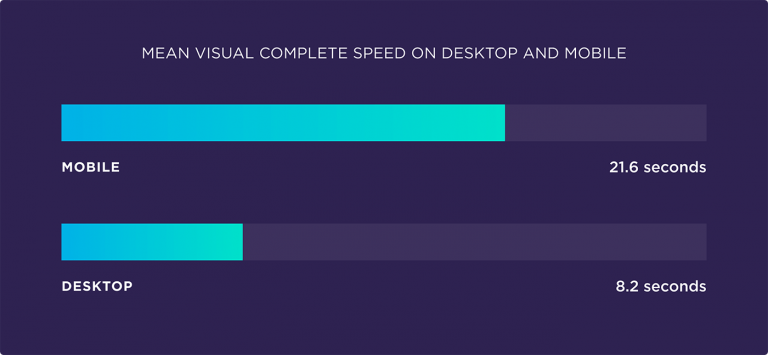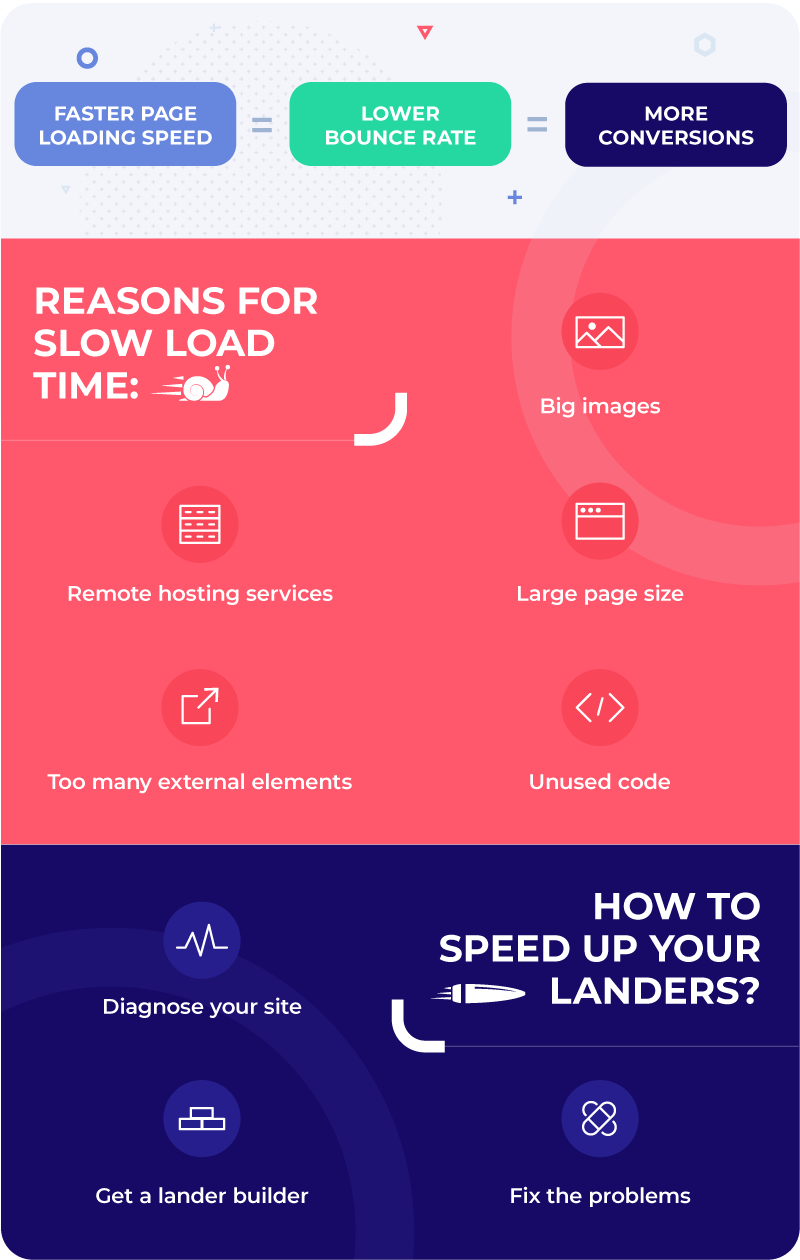Many components affect the performance of your affiliate marketing campaigns. Page loading speed is one of them. And while it’s the offer that can make or break your campaign, the page loading time plays a very important role in creating a memorable customer experience.
If you want to learn about the impact of page loading speed, read the article below and increase your conversions by optimizing your landers!
How loading time affects the performance of your landing page?
You can find plenty of information about the effects of page loading speed on the performance of websites, stores, and all kinds of landers on the Internet. It’s something that has been measured countless times already, and the verdict is always the same. Page loading speed matters.
Regardless of what type of business you run, as long as you have a website, page speed dictates more than just search engine rankings. In affiliate marketing, page loading speed affects your lander Click-Through Rate and conversions.
Internet users tend to care about their experience of browsing a web page. Google noticed that a long time ago and decided to rank faster loading sites higher. If you’re thinking that this information doesn’t affect you as an affiliate marketer, you’re wrong. Even though your sites might not be intended for Google rankings, load speed can still significantly affect your bounce rates.
When someone clicks on your ad, they are redirected to your lander (optionally straight to the offer page, but we won’t focus too much on that). The longer they have to wait for your site to load, the higher the chances they will just drop out of the funnel. Nobody has the time to wait for a page to load, especially when it’s unfamiliar.
Additionally, nearly 80 percent of users who had a poor experience with a certain website will avoid it at all costs and never return. So, if your page fails to load, or the load speed is subpar, you are risking losing that user forever. And if your strategy involves showing the same ad (e.g. push notification) to the same user base multiple times, it simply won’t work anymore.
What is a good landing page load speed?
The simplest answer we can give to that question is: the faster the website, the better. But while it’s best to always strive for perfection, sometimes that’s just not possible to achieve. Despite load time being a huge part of a good user experience, it isn’t always the most important factor.
The average time it takes to fully load a website is 10.3 seconds on desktop and 27.3 seconds on mobile, according to the data gathered by Backlinko. While it seems a whole lot, remember that we’re talking about a fully loaded website with 100% functionality. Load times to the ‘Visually Complete’ stage of a website are lower, however, there is a huge difference between desktop and mobile speed:

While these website loading times might seem like you still have a lot of room for maneuvers, it might not be the case. You need to keep in mind that the 5 million desktop and mobile pages that were a part of this research, belonged to a wide variety of niches. Most of them were trusted and well-known websites with hundreds of regular visitors.
In affiliate marketing, you need to treat page load times as more of a priority. Why? Well, because the purpose of your web page is to convert. The user experience should be your priority because that’s exactly what leads to conversions. If a page takes a long time to load, the information isn’t clear and the CTA button is somewhere way down and obstructed from view by annoying graphics – you can say goodbye to sales.
In a study conducted by Akamai, 40% of visitors were observed leaving a landing page if they had to wait for longer than 3 seconds. Other sources are also claiming 3 seconds to be the maximum amount of time that your site can take to load before the potential customer becomes impatient.
Overall, it doesn’t matter that you’re not trying to rank your site in Google search results. Speed has an impact on the performance of your campaigns. If you want to lower the bounce rate and increase the credibility of your site (especially important for e-commerce campaigns!) you should take an effort to make your web pages load faster.
Preferably, under 3 seconds.
Tools for checking how fast your landing page loads
Before we focus on speeding up your sites, you need to check what you’re working with. Luckily, there are plenty of paid and free websites designed to check how fast your site loads. Here are some of the best choices:
- GTmetrix offers both a professional and a free version of their services. It has very broad functionality as well. You can check how your page loads on different devices and in different locations. You can also track your performance over time. Overall, it’s an advanced tool, which might come in handy once you begin to scale your campaigns.
- Pingdom starts at $10 a month but offers a free demo and a 14-day free trial. The website offers user monitoring and real-time alerts for any changes in the performance or functionality of your sites. It’s yet another advanced tool for data tracking, perfect for digital marketers.
- WebPageTest is a very simple and functional tool, ideal for beginners and affiliates with basic needs. It lets you choose the test location, browser, type of connection as well as some more technical variables. It’s simple, easy to use, and, most importantly, free.
- PageSpeed Insights is yet another free tool for checking the speed of your pages. Apart from basic functionality, it also offers diagnostics and suggestions for improving your page speed. Being the product of Google itself, PageSpeed Insights is not only helpful in affiliate marketing but it also serves as a useful SEO tool for free traffic enthusiasts.
- Fast or Slow is a global website speed profiler. It’s free and provides a comprehensive report of your website speed from various data centers around the world. It gives you access to a shareable audit of your site which you can save for later or share with your teams. It’s an all-around great tool that points right to the solution to your speed problems.
Hopefully, next time you’re wondering if your site isn’t taking too long to load, you can just take a look at that list and check it.
How to speed up your website’s loading time?
That brings us to the actionable section of this article. There are actually many ways of speeding up a website. Some are more and some are less complicated. It’s important to note, though, that if you have coding experience, you’ve got a lot of additional research to do. Since this article is geared towards beginners and intermediate affiliates, we won’t go into too many details.
First of all, you need to get access to the website you want to optimize. If your strategy is based on ripping sites straight from a spy tool, then you might have to invest in a landing page builder first. Zeropark did some research for you already, and you can find our recommendations for top 9 landing page builders here.
Whether you’re building your site from scratch or trying to optimize a copied lander, here are some tips for making your site load faster:
- Optimize the graphics and avoid using large images
- Try using next-gen image formats which provide better compression
- Change your hosting to the same country as where you’re running your offer
- Reduce the number of external loading elements
- Remove unused JavaScript and CSS (here’s a useful tool for that)
- Avoid using or reduce third-party code
- Use a fast hosting service or VPS
- Reduce page weight by cleaning up the code
- Consider using a cloud-hosted tracker
That might sound complicated to a complete newbie but unfortunately, optimizing landing pages is a bit more advanced than optimizing a campaign. However, some tools can help even when you’re not a technical person with coding experience.

Page speed optimization tools
Let’s get down to business now. If your web pages are slow to load, you need to do something about it. But first, you need to know where the problem lies and how to fix it. Out of the speed checkers that we’ve mentioned in the previous sections, PageSpeed Insights is the ideal tool to start your optimization efforts.
The tool by Google is perfect for identifying problems with your site. Not only identifying, though. It also gives you a list of areas for improvement and suggestions on how to do that. Once you do have a list of things to work on, you can plan your actions.
Unfortunately, no software can optimize your pages for you with a click of a button. Website optimization happens in coding programs. Or in landing page builders. And every affiliate knows that as soon as the business gets serious, lander builders become essential.
Here is a reminder of how beneficial lander builders can be to your campaigns:
✔ market saturation is high so you need to stand out – copycatting landers from spy tools won’t get you far
✔ the best way to find winners is by split testing different ideas – landing page builders let you easily make both small and big changes to your site
✔ they give you full control over the look and functionality of your site – you can make adjustments to unify your tunnel
✔ you can make changes necessary to comply with the policies of affiliate networks and traffic sources
✔ you can let your imagination run wild – you have the full autonomy to come up with innovative landers, build them from scratch or completely transform ripped pages
Most importantly, however, you can make the invisible changes that speed up your load time and help your site seem more professional. External image resizing software might come in handy, but most of the complicated-sounding page size optimizations can be done in a lander builder.
Luckily, all landing page building software offer tutorials, documentation, guides, often real-time support to make sure even the least technical person can take advantage of their full functionality.
So, even if all of our tips and tricks on how to speed up the load time of your website seem like all Greek to you, investing in a lander builder can help. After all, you’re either a coding expert or you invest in tools that let you easily control your site. Ripping and running straight from spy tools is not what you should be doing as a long term strategy. While it might work for scoring your first conversions, it won’t be enough to scale.
Don’t forget about different optimization strategies for mobile vs. desktop as well. Lander builders know the tricks, so that’s one less thing for you to work on, too.
Investing in a landing page builder is the right thing to do.
Conclusions
Beginner affiliate marketers should focus on basic steps such as correct tracking setup, finding a good offer, campaign optimization, and understanding the business. Making your site load fast is a step for intermediate and advanced marketers. You can be profitable using simple landers and ready-made websites. But in order to scale, you need to think big!
Website speed has an impact on more than just your position in search engines. In affiliate marketing, it affects the user experience. If you want people who stumble onto your landing page to convert, your page needs to load fast. Otherwise, they are likely to drop out of the funnel.
If your page takes 10 seconds to load you have already lost customers. If it takes 2 seconds to load, on the other hand, you are probably doing everything you can to ensure that even the impatient people who are trying to get to your website won’t drop out in the process.
As much as it might seem complicated, it doesn’t take much to make your website load quickly. The first step you need to take is to take a speed test and then identify the problem. Your lander builder will make the process of optimization pleasant and easy. And your efforts will pay off in additional conversions.
Are your landing pages passing the speed tests? If not, you know what to do. And when your landers are optimized and ready, try our traffic and watch these conversions flow!
Want to try your freshly optimized landers?
Join Zeropark Now!
Magdalena Bober


